Democratic revolution is a revolution that installs a democratic government.
Contents
Democratic revolution may refer also to:
Democratic revolution is a revolution that installs a democratic government.
Democratic revolution may refer also to:

Mongolia is a landlocked country in East Asia, bordered by Russia to the north and China to the south. It covers an area of 1,564,116 square kilometres, with a population of just 3.3 million, making it the world's most sparsely populated sovereign nation. Mongolia is the world's largest landlocked country that does not border a closed sea, and much of its area is covered by grassy steppe, with mountains to the north and west and the Gobi Desert to the south. Ulaanbaatar, the capital and largest city, is home to roughly half of the country's population.

Politics of Mongolia takes place in a framework of a semi-presidential multi-party representative democracy. Executive power is exercised by the Prime Minister, who is the head of government, and the Cabinet. The President is the head of state, but holds limited authority over the executive branch of the government, unlike full presidential republics like the United States. Legislative power is vested in parliament. The Judiciary is independent of the executive and the legislature.
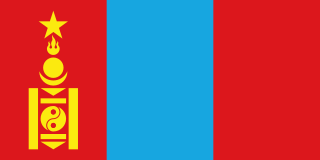
The Mongolian People's Republic was a socialist state which existed from 1924 to 1992, located in the historical region of Outer Mongolia in East Asia. It was ruled by the Mongolian People's Revolutionary Party and maintained close links with the Soviet Union throughout its history.
A green party is a political party based on the principles of green politics.
This article is about the period of modern democratic era of Mongolia since its democratic revolution of 1990.
The Mongolian People's Party (MPP) is a social democratic political party in Mongolia. It was founded as a communist party in 1920 by Mongolian revolutionaries and is the oldest political party in Mongolia.
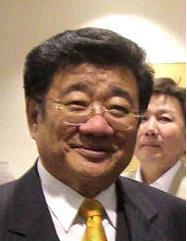
Punsalmaagiin Ochirbat is a Mongolian political figure and a current member of the Constitutional Court of Mongolia. He served as a president of Mongolia from 1990 to 1997 first as Chairman of the Presidium of the People's Great Khural in 1990 then, as the President of the Mongolia from 1990 to 1997, he is the first President of Mongolia to be elected by direct popular vote.
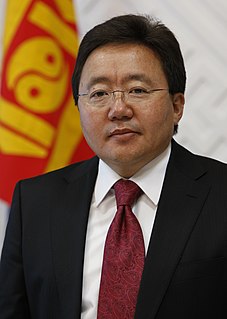
Tsakhiagiin Elbegdorj is a Mongolian politician who served as President of Mongolia from 2009 to 2017. He previously served as Prime Minister in 1998 and again from 2004 to 2006.

The Democratic Party is a liberal political party in Mongolia.

The State Great Khural is the unicameral parliament of Mongolia. It is located in the Government Palace.

The Revolutions of 1989, also known as the Fall of Communism, was a revolutionary wave that resulted in the end of most communist states in the world. Sometimes this revolutionary wave is also called the Fall of Nations or the Autumn of Nations, a play on the term Spring of Nations that is sometimes used to describe the Revolutions of 1848 in Europe. It also led to the eventual breakup of the Soviet Union—the world's largest communist state—and the abandonment of communist regimes in many parts of the world, some of which were violently overthrown. The events, especially the fall of the Soviet Union, drastically altered the world's balance of power, marking the end of the Cold War and the beginning of the Post-Cold War era. The reason it is called the "Revolutions of 1989" is because 1989 was the peak year of the revolutions.
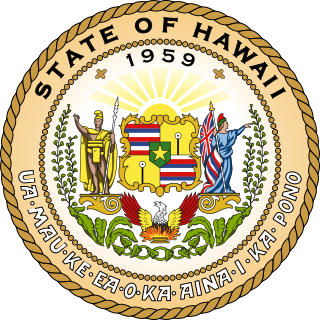
The politics of the U.S. state of Hawaii typically take place within the framework of a Democrat-dominated government.

Legislative elections were held in Mongolia in 1990. The State Great Khural was elected on 22 June 1990, with a second round on 29 June, at which time the Little Khural, the new second chamber, was also elected.

The Mongolian Revolution of 1990, known in Mongolia as the 1990 Democratic Revolution, was a peaceful democratic revolution which led to the country's transition to a multi-party system. It was inspired by the economic reforms of the Soviet Union in the late 1980s and was one of the many revolutions of 1989. It was led mostly by young demonstrators who rallied at Sükhbaatar Square, in the capital Ulaanbaatar. The main organisers of the demonstrations included Davaadorjiin Ganbold, Tsakhiagiin Elbegdorj, Sanjaasürengiin Zorig, Erdeniin Bat-Üül, Bat-Erdeniin Batbayar, and Dogmidiin Sosorbaram.

Sanjaasürengiin Zorig was a prominent Mongolian politician and leader of the country's 1990 democratic revolution. His supporters called him the "Golden Magpie of Democracy". After his death, his sister Oyuun entered politics and founded the Civic Will Party.
Erdeniin Bat-Üül is a prominent Mongolian politician from the Democratic Party and a former Mayor of Ulaanbaatar City and Governor of the Capital City.
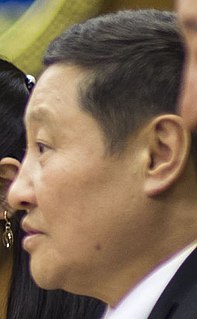
Norovyn Altankhuyag is a Mongolian politician who was the Prime Minister of Mongolia from 2012 to 2014 and a Member of Parliament. Democratic Party's National Consultative Committee (NCC) elected him as the Leader of Democratic Party of Mongolia in 2008. He was First Deputy Prime Minister of Mongolia in the coalition government of the Mongolian People's Party and Democratic Party from 2008 to 2012.

Presidential elections were held in Mongolia on 26 June 2013. The Democratic Party nominee, incumbent President Tsakhiagiin Elbegdorj was re-elected, defeating both Mongolian People's Party nominee of parliament member Badmaanyambuugiin Bat-Erdene and Mongolian People's Revolutionary Party nominee Natsagiin Udval, who was Minister of Health at the time of the election. Elbegdorj was inaugurated on 10 July 2013 for his second term in office.
Dashdorj Bayarkhuu is a Mongolian research professor, columnist and writer and former Ambassador of Mongolia to Egypt. Prior to his nomination to the ambassadorial position, Bayarkhuu worked in media, defense, diplomatic and educational sectors. After his tenure as ambassador in Cairo, Bayarkhuu returned to academic field as a Visiting Professor of International Politics and Contracted Researcher. He joined the Ministry of Foreign Affairs of Mongolia as Deputy Director, Policy Planning & Co-ordination Department in 2015–2016.